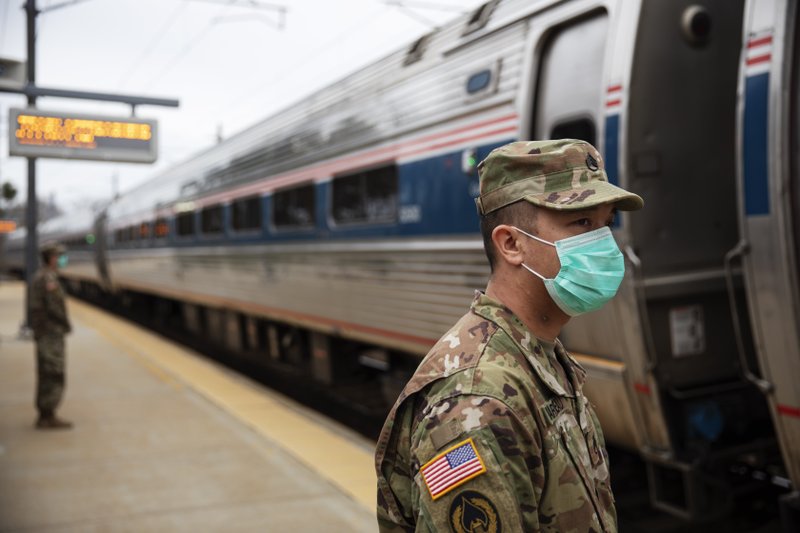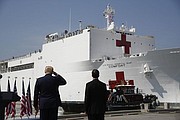NORFOLK, Va. -- President Donald Trump backed away from calling for a quarantine for coronavirus hot spots in New York, New Jersey and Connecticut, instead directing Saturday night that a "strong Travel Advisory" be issued to stem the spread of the outbreak.
After consulting with the White House task force leading the federal response and with the governors of the three affected states, Trump tweeted: "I have asked the CDCgov to issue a strong Travel Advisory, to be administered by the Governors, in consultation with the Federal Government. A quarantine will not be necessary."
Trump had told reporters earlier that he had spoken with Republican Gov. Ron DeSantis of Florida and others who wanted the federal government to restrict travel from the New York metropolitan area to their states.
Trump had said he was considering a quarantine as early as Saturday for the hot spots in New York, New Jersey and Connecticut, though it wasn't clear whether he had the power to order state residents to stay put.
[CORONAVIRUS: Click here for our complete coverage » arkansasonline.com/coronavirus]
Trump said he had spoken with DeSantis and others, and that "a lot of the states that are infected but don't have a big problem, they've asked me if I'll look at it, so we're going to look at it."
New York Gov. Andrew Cuomo, who criticized the federal government's response as his state became the country's virus epicenter, said the issue did not come up in a conversation he had with Trump earlier Saturday.
"I don't even know what that means," the Democrat said at a briefing in New York. "I don't know how that could be legally enforceable, and from a medical point of view, I don't know what you would be accomplishing. ... I don't like the sound of it."
Trump made his remarks while on a trip to Norfolk, Va., to see off a U.S. Navy hospital ship heading to New York City to help with the pandemic. He spoke to a sparse crowd at the naval base and cautioned Americans to take virus protections, even though he, at 73, is in a high-risk category and among those who have been advised to refrain from all nonessential travel.
[Video not showing up above? Click here to watch » https://www.youtube.com/watch?v=um5MI2FtNVE ]
In an interview with CNN, Cuomo said that attempting to lock down New York would be "a federal declaration of war" that ran afoul of states' rights and would create "chaos and mayhem." Targeted quarantines would shock the economy, the opposite of what Trump has said he wants, Cuomo said.
The federal government is empowered to take measures to prevent the spread of communicable diseases between states, but it's not clear that means Trump can ban people from leaving their state. It has never been tested in the modern era -- and in rare cases in which any quarantine was challenged, the courts generally sided with public health officials.
Courts have ruled consistently for years that the authority to order quarantines inside states rests almost entirely with the states, under provisions in the Constitution ceding power not explicitly delegated to the federal government to the states.
The federal government, though, would have power under constitutional clauses regulating commerce to quarantine international travelers or those traveling state to state who might be carriers of deadly diseases.
[Video not showing up above? Click here to watch » https://www.youtube.com/watch?v=6mu4MLV4_zs ]
Still, "it is entirely unprecedented that governors or the president would prevent people from traveling from one state to another during an infectious disease outbreak," said Lawrence Gostin, a Georgetown University law professor and public health specialist who questioned Trump's ability to order a quarantine on states.
The president probably would exceed the powers granted him in the Constitution if he were to quarantine New York and nearby areas, Gostin said.
But as Trump traveled to Norfolk, he tweeted: "I am giving consideration to a QUARANTINE of developing "hot spots", New York, New Jersey, and Connecticut. A decision will be made, one way or another, shortly."
Mark Meadows, Trump's incoming chief of staff, said the White House was examining its legal authority. "We are evaluating all of the options right now," he told reporters.
A quarantine wouldn't necessarily come with any legal force or penalty, just the hope that people would comply in an effort to try to contain the virus's spread.
[Gallery not loading above? Click here for more photos » arkansasonline.com/329targeting/]
The governors of Florida, Maryland, South Carolina and Texas already have ordered people arriving from the New York area to self-quarantine for at least 14 days upon arrival. In a more dramatic step, Rhode Island police have begun pulling over drivers with New York plates so the National Guard can collect contact information and inform them of a mandatory 14-day quarantine.
Trump said the idea of isolating many in the trio of Democratic strongholds in the Northeast was pushed by DeSantis, one of the president's most outspoken supporters. It came a day after Trump made clear that he wanted governors to be grateful when asking for federal support for the pandemic.
Trump said people "go to Florida, and a lot of people don't want that. So we'll see what happens." He later clarified that a quarantine would not affect truckers or people transiting through, and it would not affect trade.
Florida is a perennial swing state and one that Trump must win come November -- plus he recently moved his residence from New York to Florida. It also has a population of 21 million, with a large percentage of older people who are particularly vulnerable to the virus.
DeSantis said Florida will soon set up a checkpoint along Interstate 95 to screen travelers, similar to one already in place along Interstate 10 to screen people from Louisiana. Many airports in Florida also are screening travelers from certain areas, requiring them to self-isolate for 14 days.
"How is it fair to them to just be air-dropping in people from the hot zones, bringing infections with them and seeding the communities with new infections that they are trying to stamp out?" DeSantis said. "I think whatever works is what we need to do."
The U.S. leads the world in reported infections, with more than 121,000. There were roughly 2,000 deaths recorded as of Saturday.
Asked at the White House about his ambition to urge many Americans to return to work by the U.S.' Easter Sunday holiday on April 12, Trump said: "We'll see what happens."
New Jersey Gov. Phil Murphy, a Democrat, said he did not talk about quarantining the tri-state area in his recent conversation with Trump, and he learned of the president's comments as he walked into Saturday's daily briefing.
"Until further notified, we're going to keep doing exactly what we're doing because we believe the data and the facts are on our side in terms of this aggressive -- as aggressive as any American state right now -- in terms of social distancing and flattening the curve," he said.
Connecticut Gov. Ned Lamont, also a Democrat, said he'd already called on residents to stay home.
"I look forward to speaking to the President directly about his comments and any further enforcement actions, because confusion leads to panic," he said in a statement.
On Friday, the president took steps to expand the federal government's role in helping produce critically needed supplies to fight the pandemic, even as he warned the leaders of hard-hit states not to cross him.
Yet Trump -- who hours earlier had suggested the need for the devices was being overblown -- rejected any criticism of the federal government's response to a public health crisis that a month ago he predicted would be over by now.
Information for this article was contributed by Mario Parker of Bloomberg News and by Jennifer Peltz, Matt Perrone, Jill Colvin, Michael Balsamo, Michael Tarm, Ben Finley, Curt Anderson, Andrew Welsh-Huggins, Zeke Miller and Colleen Long of The Associated Press.
A Section on 03/29/2020

